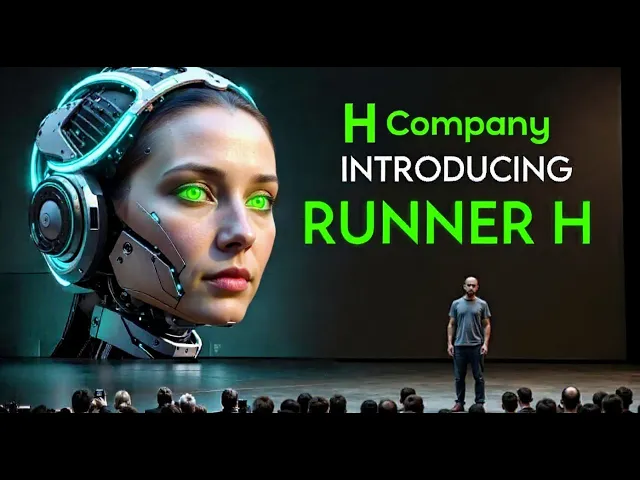NEW AI Agent RUNNER H Is TOO Powerful to Be Free (But it is… for now)

Runner H is disrupting the AI agent market
In a tech world overflowing with AI tools that promise the world but deliver incremental benefits, something genuinely disruptive has emerged. Runner H, a new AI agent platform, has quietly dropped onto the scene with capabilities that are turning heads across the industry. Unlike the parade of AI tools that require complex setup or technical know-how, this one arrives with a simplicity that belies its power.
What makes Runner H different
Runner H represents a significant evolution in how AI agents operate and interact with users, bringing several standout capabilities to the table:
-
True autonomous operation: Unlike many so-called "AI agents" that require constant human guidance, Runner H can genuinely operate independently, making decisions and taking actions without continuous human input. It maintains context across sessions and builds a progressive understanding of your needs.
-
Universal integration capabilities: The platform connects seamlessly with virtually any service that has an API, from email and calendars to specialized business tools, without requiring users to build custom integrations. This allows it to operate across your digital ecosystem rather than within isolated environments.
-
Radical simplicity in a complex field: Despite its advanced capabilities, Runner H offers an onboarding process measured in minutes rather than days. Users simply connect their accounts and describe what they need in plain language—no programming, prompt engineering, or technical setup required.
-
Memory that actually works: Where many AI tools struggle to maintain context beyond a single session, Runner H builds a genuine understanding of your preferences, past requests, and working style that improves over time, creating a truly personalized assistant.
-
Free access to enterprise-grade capabilities: Perhaps most disruptively, these advanced features are currently available without cost, though this appears to be a temporary situation as the platform gains traction.
The paradigm shift that matters
The most significant breakthrough with Runner H isn't any single technical feature—it's the fundamental shift in how we interact with AI tools. Previous generations of AI assistants have required humans to adapt to the technology, learning specific commands, working within rigid constraints, and managing the tool itself. Runner H inverts this relationship, adapting to human needs and communication styles rather than forcing users to speak its language.
This matters enormously for business adoption. Enterprise software traditionally suffers from implementation challenges and adoption friction—employees resist tools that ad
Recent Videos
How To Earn MONEY With Images (No Bullsh*t)
Smart earnings from your image collection In today's digital economy, passive income streams have become increasingly accessible to creators with various skill sets. A recent YouTube video cuts through the hype to explore legitimate ways photographers, designers, and even casual smartphone users can monetize their image collections. The strategies outlined don't rely on unrealistic promises or complicated schemes—instead, they focus on established marketplaces with proven revenue potential for image creators. Key Points Stock photography platforms like Shutterstock, Adobe Stock, and Getty Images remain viable income sources when you understand their specific requirements and optimize your submissions accordingly. Specialized marketplaces focusing...
Oct 3, 2025New SHAPE SHIFTING AI Robot Is Freaking People Out
Liquid robots will change everything In the quiet labs of Carnegie Mellon University, scientists have created something that feels plucked from science fiction—a magnetic slime robot that can transform between liquid and solid states, slipping through tight spaces before reassembling on the other side. This technology, showcased in a recent YouTube video, represents a significant leap beyond traditional robotics into a realm where machines mimic not just animal movements, but their fundamental physical properties. While the internet might be buzzing with dystopian concerns about "shape-shifting terminators," the reality offers far more promising applications that could revolutionize medicine, rescue operations, and...
Oct 3, 2025How To Do Homeless AI Tiktok Trend (Tiktok Homeless AI Tutorial)
AI homeless trend raises ethical concerns In an era where social media trends evolve faster than we can comprehend them, TikTok's "homeless AI" trend has sparked both creative engagement and serious ethical questions. The trend, which involves using AI to transform ordinary photos into images depicting homelessness, has rapidly gained traction across the platform, with creators eagerly jumping on board to showcase their digital transformations. While the technical process is relatively straightforward, the implications of digitally "becoming homeless" for entertainment deserve careful consideration. The video tutorial provides a step-by-step guide on creating these AI-generated images, explaining how users can transform...
